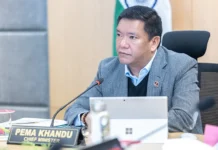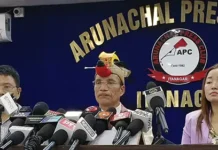Staff Reporter
ITANAGAR, 29 Aug: In a damning indictment of the Arunachal Pradesh government, the Supreme Court has quashed all allegations against Mepung Tadar Bage, member of the Arunachal Pradesh Public Service Commission (APPSC), and has recommended the immediate revocation of her suspension.
Delivering a damning ruling, the Court concluded: “The actions alleged against the respondent do not meet the threshold of ‘misbehaviour’; rather, they do not even meet the threshold of ‘lapse’.” “There is nothing to show that her conduct… contributed in any way to bringing disrepute to the APPSC.”
The court emphasized that Bage, who was appointed in August 2021, could not be blamed for institutional failures dating back to 2017, nor was there any evidence of her involvement in the 2022 paper leak scandal. The Central Bureau of Investigation (CBI), which probed the leak, had not named Bage as an accused.
The court criticized the basis of the removal request, particularly letters from the chief minister and the governor, which the bench described as prejudiced and devoid of evidence.
“These letters… make it clear that the state dealt with the matter with prejudice… without sufficient material or evidence.”
“Summarily holding her responsible… would further erode the roots of the Constitutional intent of Article 317.”
“In the present case, right from the very beginning, the letter of the chief minister to the governor, dated 27.10.2022, states that ‘The commission members, with allegations of tainted selection procedures, cannot claim any immunity and should have resigned on their own, as was done by the chairman of the APPSC.’ Likewise, the letter of the governor to the president of India dated 02.12.2022 states that the respondent, being the last remaining member (others having tendered resignation), must be removed, and a fresh commission must be instituted to restore trust in the commission. Both the above letters impute responsibility for the leakage of the question paper for the mains examination upon the members of the commission, even though there was no such finding in the inquiry report. In our opinion, these letters further make it clear that the state dealt with the matter with prejudice, assuming the members of the commission were responsible for the paper leakage without sufficient material or evidence to reach such a conclusion. These letters were toned in a manner that it was absolutely imperative for the members to resign and for a new commission to be constituted to resolve the issues of confidentiality.”
The Supreme Court said such actions could undermine the autonomy and protection constitutionally granted to public service commission members. The court reaffirmed that Article 317 was designed to insulate constitutional functionaries from political vendetta, not to facilitate it.
One of the most striking elements of the ruling was the court’s observation that other commission members who resigned were later appointed to new government roles, while Bage, who stood her ground, was singled out for removal.
“The state government bequeathing responsibility upon such members… while targeting the respondent is arbitrary and discriminatory.”
The court ruled, “We recommend that her suspension be revoked forthwith and she would be entitled to all consequential benefits.”
The Pema Khandu government, caught in the web of protests after the paper leakage, allegedly forced the members out of the commission, disregarding constitutional provisions, citing moral responsibility. They were, however, rewarded with appointments to other constitutional bodies in the state, prompting the SC to ask several questions.
It said: “If the members of the APPSC who were allegedly collectively found involved in the paper leak, as per the letter of the chief minister, later resigned and received new assignments by the state, it is a question to ponder upon, which ought to be looked into by the state, especially since Article 319(d) of the Constitution of India bars members of a state public service commission from taking up any other employment either under the
Government of India or under the government of a state after they cease to be in office. In our view, if the members were collectively involved, the act of the state government bequeathing responsibility upon such members and giving them assignments of posts with responsibilities clearly indicates that there was nothing against the chairman or any member of the commission showing their indictment in a personal capacity for committing any act or omission that may prove misbehaviour on their part.
“In our view, the act of the state requesting the president of India to initiate the removal of the respondent is arbitrary, unfair, and discriminatory,” the SC said.
The APPSC fiasco began with the leakage of question papers for the assistant engineer mains examination, held on 26-27 August, 2022. On 28 August, 2022, a candidate, Gyamar Padang, lodged a complaint, alleging that the questions for the examination were leaked by the APPSC in collusion with coaching institutes. An FIR was filed on 10 September, 2022, leading to a series of investigations. The Special Investigation Cell (Vigilance) took over the matter on 27 September, and eventually the case was transferred to the Central Bureau of Investigation (CBI) on 26 October, 2022.
Subsequent investigations revealed that Taket Jerang, the deputy secretary-cum-deputy controller of examinations at the APPSC, was the primary figure behind the leakage. His activities involved tampering with question papers, including monetary exchanges.
A high-level inquiry committee was constituted by the Government of Arunachal Pradesh in September 2022 to investigate the irregularities in the mains examination. The committee’s report, submitted in October 2022, found lapses in maintaining the confidentiality of the question papers, including failure to follow standard operating procedures (SOP). However, the inquiry did not specifically address the actions of the APPSC members.
Following the report, several APPSC members, including the chairman, resigned, citing moral grounds. Bage remained the only member of the commission at that point. On 2 December, 2022, the governor of Arunachal Pradesh requested the president of India to initiate proceedings under Article 317(1) for her removal.
Under Article 317(1) of the Constitution, a member of a public service commission can only be removed on the grounds of “misbehaviour” following an inquiry by the Supreme Court.



